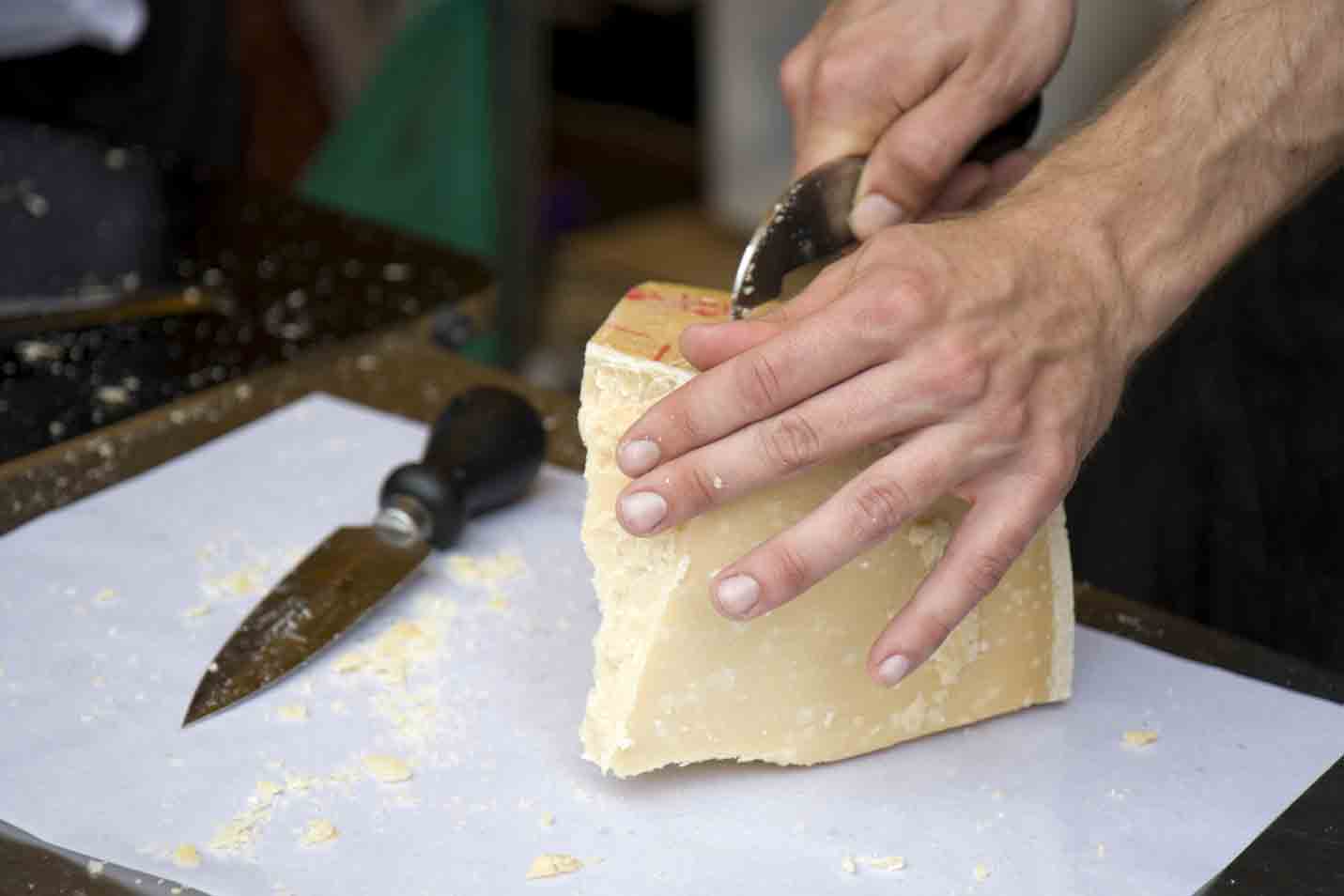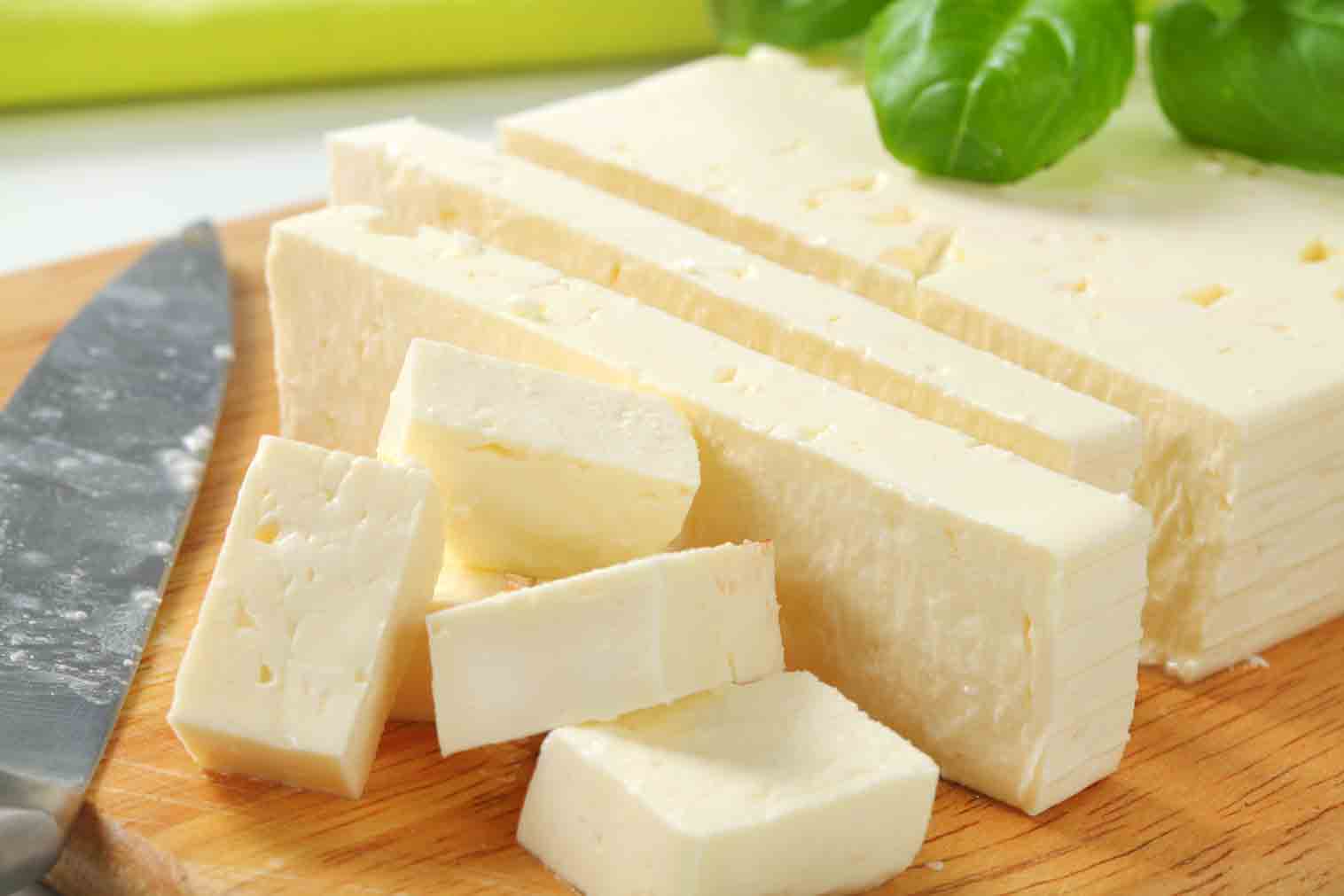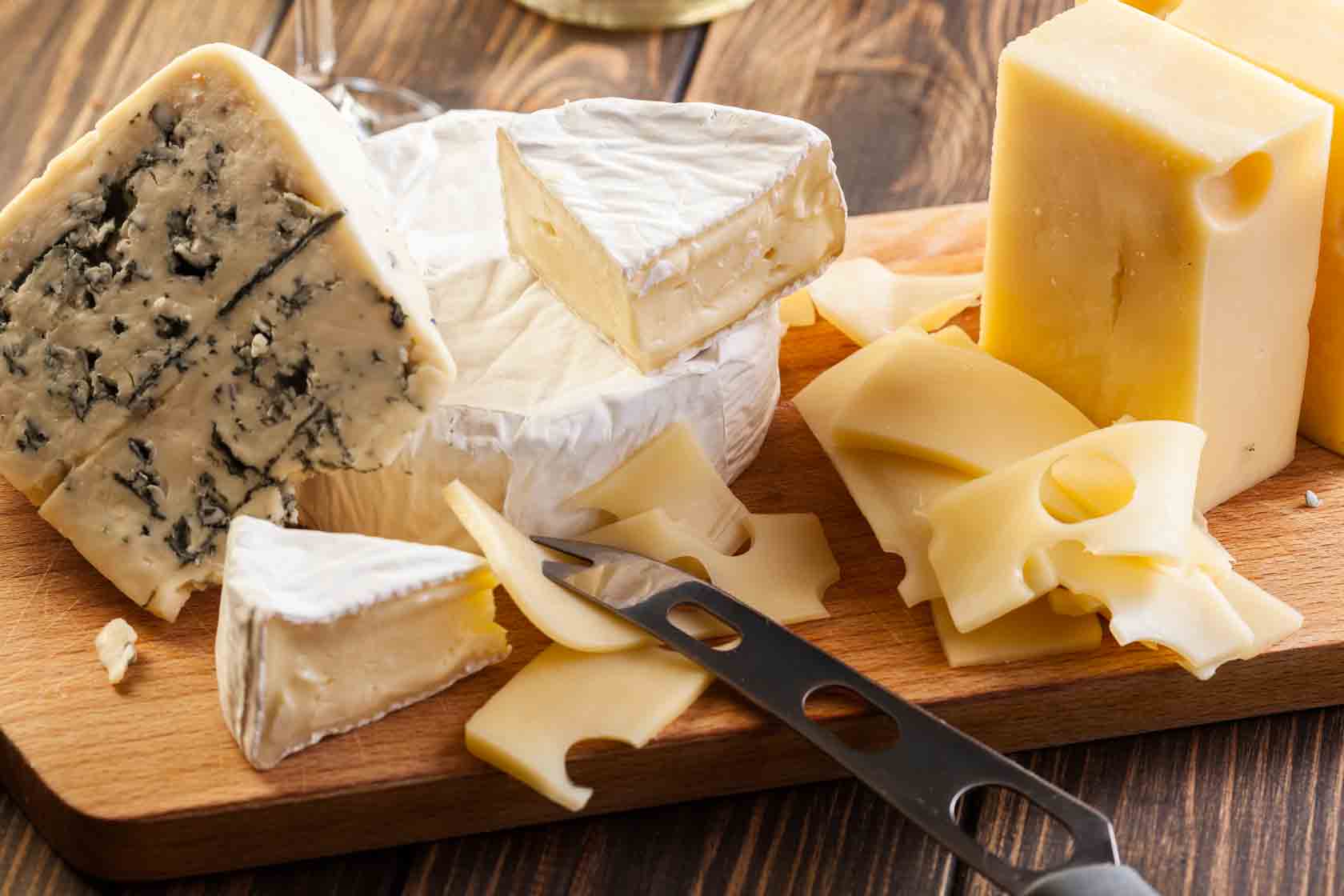Cheese is one of the most consumed foods on the planet. But does cheese offer any benefits beyond tickling our taste buds? Is cheese good for you? Should we be eating as much of it as we do?
People in many parts of the world adore cheese.
Once a means of preserving the milk of domesticated mammals, and later a delicacy for the elite, cheese is now almost everywhere, and seemingly in nearly everything.
Why Cheese Is Everywhere in the United States
In the U.S., in particular, cheese has been popularized, subsidized, and valorized into one of the staples of our diet.
- Popularized: The powerful dairy industry convinced the U.S. government decades ago to promote its product in public school curricula as a “basic food group.” Today, the powerful Dairy Management, Inc. is funded by the U.S. government and charged with increasing the amount of cheese eaten by American consumers.
- Subsidized: Even though Americans are eating more cheese than ever, demand can’t keep up with the production of cheese by the dairy industry. The United States Department of Agriculture has repeatedly bailed out the struggling industry by purchasing tens of millions of dollars of cheese and donating it to food pantries.
- Valorized: The dairy industry and its partners promote cheese as a heart-healthy food that helps growing bodies build strong bones. Through positions of influence on the boards and panels that set nutrition policy, cheese cheerleaders have written cheese-positive language into our nutritional guidelines.
These industry tactics have worked. In the United States, the average person consumes about 39 pounds of cheese per year.
What About the Rest of the World?
The amount of cheese most Americans eat pales in comparison with the amount put away by some Europeans.
The countries with the highest cheese consumption are Denmark, Iceland, Finland, and France, where residents average 60 to 62 pounds of cheese per year.
However, cheese-eating isn’t universal. People in China, parts of South America, and Africa eat, on average, less than one pound per year. And as we’ll see, there’s a very good reason for this — which has nothing to do with taste preferences.
What Exactly Is Cheese?

Cheese is a dairy product. It’s typically made by coagulating the milk protein casein, then adding an acid and the enzyme rennet (usually found in the stomachs of ruminant animals like cows, sheep, and goats, although vegetarian alternatives exist).
The solid parts (curds) are formed into the final product, which is usually in the shape of a block or a round.
The basic ingredients in most cheeses are water, bacteria (which digests the milk sugar and converts it to lactic acid), milk fat, milk protein (primarily casein), and lots of salt.
The nutritional composition of cheese will depend on the ratio of these components and what else is added. Cheese is mostly protein, saturated fat, cholesterol, and sodium. Many soft kinds of cheese consist of over two-thirds saturated fat.
Interesting fact: The bacteria used to make some types of cheese (brevibacteria and Staphylococcus epidermidis) are the same bacteria found in body odor and smelly feet. Yuck!
Health Claims About Cheese
Dairy promoters market cheese as a nutritious snack and a convenient way to get certain nutrients.
They also claim that cheese supports strong bones and healthy hearts. Their arguments typically take the form of, “Cheese contains X, which can be good for Y. Therefore, cheese is good for Y.”
For bone health, the argument looks like this: Cheese contains calcium and vitamin D, which are essential nutrients for bone health.
The argument for heart health is similar, just focused on different nutrients: Cheese contains conjugated linoleic acid (CLA), a fatty acid suggested to have a positive impact on heart health. Studies have shown its potential to prevent plaque buildup in your arteries and reduce inflammation.
Problems with These Claims
But there are some problems with these claims:
First, it’s a logical fallacy to claim that because a product contains a known nutrient, the whole product is good for you. If you added vitamin C to a quart of motor oil, you couldn’t credibly claim that drinking motor oil will prevent the common cold. Just because foods contain good things doesn’t mean they outweigh all the bad stuff.
Second, studies may be heavily biased. The dairy industry sponsors a lot of the research the shows the health benefits of dairy. This research tends to be reductionist (looking at individual nutrients rather than the entire nutritional profile), short-term (measuring results in hours or days, rather than following participants for years and assessing the actual outcomes of their cheese eating), and designed to look at dairy in the best possible light.
Even when scientists claim that their funding sources don’t affect the designs or results of their research, we should be skeptical. When soda makers and junk food companies sponsor studies, they show much more favorable health outcomes than studies funded by neutral bodies.
These industries discovered that paying for scientific research was at least as cost-effective as straight-up advertising. If you can slap the word “science” on a claim, not only are consumers more likely to find the information believable, but the mass media will amplify the findings and lend them even greater credibility.
Most of what we think of as “cheese facts” are simply marketing and advertising dressed up as science.
Is Cheese Good for You?
It turns out that cheese is far from a health food.
In a society staggering under the weight of chronic disease and obesity, cheese is a major contributor of saturated fat and sodium.
The proteins in cheese are associated with cancer progression. Not to mention, the dairy industry itself is a scourge on the planet.
Let’s take a quick look at the truth about cheese.
8 Problems With Eating Cheese

Is cheese good for you? Here are eight facts about cheese that you probably never learned in school:
1) Cheese Is Addicting
Have you ever noticed that it’s hard to stop after just one slice of melty, gooey cheese pizza?
This is more than a struggle of willpower. Cheese contains opiate-like compounds called casomorphins that have a similar effect on your brain as do certain addictive drugs.
And there’s a biological reason for casomorphins: to make sure growing baby calves drink their mom’s milk. The casomorphins in cheese can be up to 10 times more concentrated than in full-fat milk.
2) Cheese Probably Isn’t Good for Your Heart
There’s a lot of evidence that diets high in saturated fat and sodium don’t support long-term heart health. Cheese contains both of these, often in substantial amounts.
The average cheese is 70% saturated fat. And processed cheeses can contain as much as 400 mg of sodium per ounce.
If you look for studies that suggest cheese is good for, or are even neutral, regarding heart health, you’ll likely come across this meta-analysis that concludes a “neutral” effect.
However, three pro-dairy organizations funded this study— Global Dairy Platform, Dairy Research Institute, and Dairy Australia. The analysis authors were accused of cherry-picking data — they excluded any study in which participants had prior cases of cardiovascular disease, diabetes, or other chronic diseases.
You might also come across this 2015 study published in The American Journal of Clinical Nutrition, which concluded that for 14 overweight, postmenopausal women, meat and cheese-rich diets were responsible for boosting HDL “good” cholesterol and were superior to low-fat, high-carbohydrate diets.
But considering that most of the carbohydrates in low-fat, high-carb diets are coming from things like sugar and white flour, this is hardly a ringing endorsement. Cheese may be healthier for you than white flour and high-fructose corn syrup — but that hardly makes it a health food. The study was, perhaps not surprisingly, fully funded by the dairy industry.
Given the strength of the link between saturated fat consumption and obesity and heart disease, and the fact that cheese is mostly made up of saturated fat, these findings, paid for by industries whose profits depend on positive press, are highly suspect.
3) Cheese Can Increase Obesity Risk
Thanks to the globalization of the Western diet, much of the world is now familiar with eating a diet high in processed foods, saturated fat, sodium, and sugar. This includes cheese.
In fact, since 1980, global cheese consumption has nearly doubled. During these same years, obesity rates around the globe have risen dramatically.
4) Cheese Can Increase Cancer Risk
Research shows that diets high in animal protein, like the casein in cheese, are linked to an increased risk for certain cancers.
Prostate cancer strongly appears to be influenced by the calcium, insulin-like growth factor (IGF-1), and estrogen in dairy products, including cheese.
5) Cheese May Damage Your Brain
There’s no lack of research on the unhealthy effects of the standard American diet (SAD). This includes an increased risk of neurodegenerative diseases.
Some studies indicate that high saturated fat consumption, a defining factor of the SAD, can increase Alzheimer’s risk. Whereas unsaturated fats may have a protective effect on the brain.
This is mainly attributed to processed cheeses.
And the SAD isn’t just popular in the United States. For example, since Japan has begun to adopt many characteristics of the SAD, the Japanese people have seen a 6% increase in Alzheimer’s disease rates.
6) Cheese Contains Compounds Your Body May Not Tolerate
Milk itself is one of the top eight food allergens.
Dairy also contains lactose, a sugar to which around 65% of the global population have an intolerance.
Lactase is the enzyme needed to break down lactose. It ensures that babies can drink their mother’s milk. But many people stop producing it after infancy, and if they continue gulping milk (and eating cheese) as adults, this can cause ongoing digestive distress.
7) Cheese Damages the Environment
When considering the health benefits of cheese, it’s also important to consider its impact on the health of the planet. And if you’re looking for sustainable foods, cheese doesn’t belong on that list.
A recent study suggests that avoiding meat and dairy are the most significant way to combat climate change.
Why? Cows produce methane, a greenhouse gas that is over 25 times as powerful as carbon dioxide at heating the atmosphere. Cheese produces 18kg of greenhouse gases per every kg of cheese consumed.
And while we’re on the topic of sustainability, it takes 10 pounds of cow’s milk to make just one pound of cheese.
8) Cheese Production Poses Ethical Concerns
As is true for every other mammal, cows have to give birth to produce milk.
Industrialized dairy cows are forcibly impregnated. To prevent loss of consumer-bound milk, newborn calves are removed from their mothers within 24 to 48 hours. Mother cows can be heard calling for their calves for days.
Many of the male calves are turned into veal. And many dairy cows themselves live under considerable distress.
One study found that by the time they are killed (at around the age of five), 40% of cows are lame as a result of standing on concrete flooring and filth in intensive confinement. Many modern dairy cows never see a blade of grass in their lives.
The Best Cheeses
If you’re going to eat cheese, here are two labels to look for: organic and 100% grass-fed.
Organic cheese means the cows ate organically grown feed. But it says almost nothing about the conditions in which the cows lived.
The cows whose milk has been made into grass-fed dairy products, on the other hand, have not been confined in feedlots, and the cheese contains more omega-3 fats, vitamin E, and CLA (conjugated linoleic acid) than their factory farmed counterparts.
Does that make grass-fed cheese a health food? It’s an improvement, and if you are going to eat dairy cheese, this is probably the best way to go. But it’s still very high in saturated fat and sodium (not to mention lactose and casein).
3 Tips for Eating Less Cheese

If all this has you thinking, “I’m ready to cut the cheese!” — here are a few steps to help you transition with ease:
- Experiment with a non-dairy “cheeze.” Most ones you’ll find are based around either nuts (often cashews or almonds), coconut oil, and some form of starch, or tofu. Although these products may not contain saturated fat (unless they contain coconut oil), most of them are still packaged, processed, high-sodium foods. Look at the ingredients list to help you make the healthiest choices.
- Try nutritional yeast (“nooch”) as a cheese replacer. It’s a versatile and healthy way to add a nutty, cheesy flavor to dishes. Sprinkle it on salad, pasta, pizza, and soup, or use it as a base for homemade cheeze as below.
- Experiment with making cheezes at home. They’re easy to make, only require a handful of ingredients, and can be pretty healthful. A few of my favorite recipes are below.
5 Healthy Vegan Cheese Recipes
Vegan Cheese Sauce by The Vegan 8
This one has no oil, nuts, or flour! Using potatoes, zucchini, and nutritional yeast as a base, this recipe incorporates a variety of delicious flavors to make a creamy and savory sauce.
Cranberry & Thyme Vegan Cheese Ball by It Doesn’t Taste Like Chicken
Many vegan cheese balls require a vegan cream cheese product, but this one doesn’t. This one uses less than 10 ingredients and makes a great savory appetizer served with crackers or raw veggies.
Cashew-Less Vegan Queso by Minimalist Baker
This is a great nut-free cheese sauce that would go well with just about anything. What’s the secret ingredient to make it so creamy? Eggplant!
Vegveeta Dip by Dreena Burton
This is an easy, cashew-based recipe that just requires a high-speed blender and a stovetop. I’ve enjoyed this dip with tortilla chips, raw veggies, and placed it on homemade pizza. If you’re oil-free, you can omit the oil or substitute water to thin it.
Vegan Tofu Feta Cheese by Simple Vegan Blog
This recipe uses pressed, marinated, and deliciously flavored tofu cubes to mimic feta.
If you enjoy what cheese adds to your meals, I encourage you to give homemade non-dairy versions a try. You just might grow to love them.
Tell us in the comments below:
-
Do you eat cheese? Why or why not?
-
What do you think? Is cheese good for you?
-
Have you ever made your own non-dairy cheeze? What recipe or ingredients did you use and how did you enjoy it?
Featured Image: iStock.com/fotek




